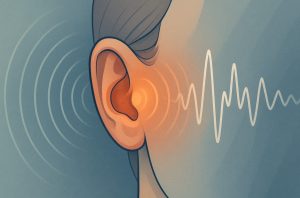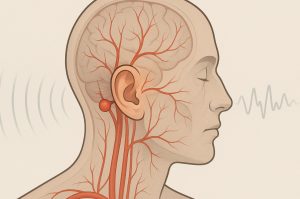Have you ever been in a quiet room and suddenly noticed a rhythmic thumping or whooshing in your ear that perfectly matches your heartbeat? Has it left you wondering whether this sensation is normal or something more serious? If so, you’re not alone. Hearing your pulse in your ear, known medically as pulsatile tinnitus, can be both puzzling and alarming.
But what causes this phenomenon? Is it something to be concerned about, or is it a harmless quirk of your body’s natural rhythms?
In this blog, we explore what it means when you can hear your pulse in your ear, what might be causing it, when it requires medical attention, and how it’s diagnosed and treated.
What Is Pulsatile Tinnitus and How Is It Different from Other Ear Noises?

Pulsatile tinnitus is a distinct type of tinnitus characterised by the perception of a rhythmic sound, often described as a thumping, whooshing, or heartbeat-like noise, in one or both ears. Unlike traditional tinnitus, which often manifests as a ringing or buzzing sound, pulsatile tinnitus is usually in sync with your heartbeat and may have an underlying vascular or structural cause.
This condition occurs when blood flow near the ear becomes turbulent or when internal changes make normally inaudible sounds detectable. While standard tinnitus often relates to hearing loss or nerve damage, pulsatile tinnitus typically stems from circulatory or anatomical changes around the ear.
It is important to note that pulsatile tinnitus can be subjective (heard only by the individual) or, in rare cases, objective (audible to a clinician through a stethoscope).
How Does Increased Blood Flow Cause You to Hear Your Pulse in Your Ear?
The sensation of hearing your heartbeat in your ear can be the result of increased or more forceful blood flow in the vessels near the auditory system. When your blood flows more rapidly than usual, or when it’s forced through narrowed or abnormal vessels, the movement can create noise that is transmitted to the inner ear structures.
There are several common scenarios in which this may happen:
- Physical exertion, such as exercise, temporarily elevates heart rate and blood circulation, which can make pulse sounds more prominent, especially in quiet environments.
- Stress and anxiety are known to trigger the release of adrenaline. This hormone increases both heart rate and blood pressure, resulting in louder internal blood flow, which may become audible.
- Hypertension, or high blood pressure, forces blood through the vessels with greater pressure. This heightened force can create noise, particularly in the vessels surrounding the middle and inner ear.
In most cases where increased blood flow is the cause, the pulsing sound is temporary and resolves once the triggering factor, such as stress or physical activity, subsides. However, persistent symptoms should always be evaluated by a healthcare professional.
What Kind of Blood Vessel Abnormalities Can Trigger This Condition?

While increased blood flow may explain temporary pulse sounds in the ear, more serious or long-term cases of pulsatile tinnitus are sometimes linked to blood vessel abnormalities near the ear or brain.
One such abnormality is an arteriovenous malformation (AVM). This condition involves an abnormal connection between arteries and veins, bypassing capillaries and creating turbulent blood flow. If located near the auditory system, AVMs can produce audible pulses.
Another possible cause is a vascular aneurysm, which is a bulging of an artery due to a weakened vessel wall. Aneurysms located near the ear or brain can also cause disruptions in blood flow that may result in a pulsating sound.
A third condition is venous sinus stenosis, where one of the veins responsible for draining blood from the brain becomes narrowed. The resulting restricted flow can generate turbulent movement of blood that is perceived as sound in the ear.
Although these conditions are relatively rare, they represent more serious causes of pulsatile tinnitus and often require imaging tests, such as MRI or CT scans, for proper diagnosis.
Can Problems Within the Ear Itself Cause You to Hear Your Pulse?
Yes, several conditions directly related to the ear can cause pulsatile tinnitus. When the normal structure or pressure of the ear is altered, internal bodily sounds may become more noticeable.
Eustachian tube dysfunction is one of the most common ear-related causes. The Eustachian tube connects the middle ear to the back of the throat and is responsible for regulating air pressure. When it’s blocked due to allergies, infections, or inflammation, pressure changes in the ear can amplify internal noises like your pulse.
Middle ear infections (also known as otitis media) can result in fluid build-up and inflammation. This affects sound transmission and can cause the ear to become more sensitive to internal sounds, such as blood flowing through nearby vessels.
Glomus tumours, though rare, are another potential cause. These are benign tumours that form in the middle ear or near blood vessels and nerves. Because they contain many blood vessels, they often produce rhythmic sounds that can be heard by the affected individual.
What Other Medical Conditions Might Be Behind This Pulsating Sensation?
Aside from vascular and ear-specific causes, several systemic conditions can increase the likelihood of experiencing pulsatile tinnitus.
Anaemia is a condition characterised by a shortage of healthy red blood cells. When oxygen delivery throughout the body is reduced, the heart compensates by pumping faster. This increased flow rate can make internal sounds like your pulse more noticeable.
Hyperthyroidism, or an overactive thyroid gland, also elevates the body’s metabolic rate and can lead to increased heart rate and blood pressure, resulting in heightened internal sounds.
Some medications, especially those affecting circulation or blood pressure—may contribute to the perception of pulsing sounds. These can include high doses of aspirin, certain antibiotics, or blood pressure medications.
In many cases, despite thorough investigation, no clear cause is found. When this happens, the condition is classified as idiopathic pulsatile tinnitus.
When Should You See a Doctor About Hearing Your Pulse in Your Ear?
Although hearing your pulse in your ear is not always a sign of a serious condition, certain symptoms should prompt immediate medical attention. These include:
- Persistent pulsing that does not improve over time
- A pulsing sound heard only in one ear
- The presence of other symptoms such as dizziness, hearing loss, or a feeling of fullness in the ear
- Headaches, blurred vision, or balance problems
- Ear pain accompanying the pulsing sound
If any of these symptoms are present, a GP or ENT (ear, nose, and throat) specialist will likely recommend further testing to rule out serious vascular or neurological conditions.
How Is Pulsatile Tinnitus Diagnosed by Medical Professionals?

Diagnosing pulsatile tinnitus begins with a complete medical history and physical examination, focusing on cardiovascular and neurological health, ear structure, and any recent illnesses.
Depending on the initial findings, the following tests may be carried out:
- MRI or CT scans to identify vascular abnormalities, tumours, or structural defects
- Ultrasound of the carotid arteries to assess blood flow and vessel health
- Audiology tests to check for hearing loss or middle ear issues
- Blood tests to screen for anaemia, thyroid function, or infection
In some cases, a doctor may be able to hear the pulsing sound using a stethoscope placed near the skull. This form of objective tinnitus is rare but easier to diagnose and treat.
What Are the Treatment Options for Hearing a Pulse in the Ear?
Treatment depends entirely on the underlying cause. If the issue is a temporary rise in blood pressure due to stress or physical activity, managing those triggers may resolve the symptoms without medical intervention.
In cases where a specific condition is identified, targeted treatment will be recommended. For example, antibiotics may be prescribed for a middle ear infection, while surgical procedures may be necessary to remove a glomus tumour or correct a vascular abnormality.
Where no treatable condition is found, symptom management becomes the focus. This can include sound therapy, lifestyle changes, and relaxation techniques to reduce the perception of the noise.
Can This Condition Be Prevented?
While not all causes of pulsatile tinnitus are preventable, adopting certain healthy habits can reduce the likelihood of experiencing symptoms:
- Maintaining normal blood pressure through diet, exercise, and, if needed, medication
- Treating upper respiratory infections promptly to avoid complications like Eustachian tube dysfunction
- Reducing exposure to loud noises that can damage hearing
- Managing chronic health conditions such as diabetes, thyroid disorders, and cardiovascular diseases
Regular medical check-ups can also play a key role in identifying and addressing risk factors before they develop into noticeable symptoms.
Causes, Symptoms, and Treatments
| Underlying Cause | Common Symptoms | Typical Treatment |
| Increased Blood Flow | Pulsing sound during or after activity | Rest, stress management |
| Blood Vessel Abnormalities | Constant pulsing, possibly one-sided | Surgery, vascular intervention |
| Middle Ear Infections | Fullness, mild pain, temporary tinnitus | Antibiotics, anti-inflammatories |
| Eustachian Tube Dysfunction | Pressure, muffled hearing, rhythmic sound | Nasal decongestants, antihistamines |
| Glomus Tumours | One-sided tinnitus, hearing loss | Surgical removal |
| Anaemia | Fatigue, fast heartbeat, audible pulse | Iron supplements, dietary changes |
| Hyperthyroidism | Anxiety, weight loss, rapid heartbeat | Beta-blockers, antithyroid medication |
| Medication-Induced | Onset after new prescriptions | Adjusting or changing medications |
| Idiopathic | No clear cause, ongoing pulsing | Sound therapy, lifestyle management |
FAQs
What does it mean when I can hear my pulse in my ear?
It usually indicates pulsatile tinnitus, which is often caused by increased blood flow, vascular abnormalities, or issues within the ear.
Is pulsatile tinnitus serious?
Not always, but it can be a sign of underlying issues like vascular malformations or tumours. Persistent or one-sided symptoms should be evaluated.
Can anxiety cause a heartbeat sound in the ear?
Yes, anxiety increases blood flow and heart rate, which can make internal sounds like your pulse more noticeable.
What kind of doctor should I see for pulsatile tinnitus?
Start with a GP, who may refer you to an ENT specialist or neurologist depending on the suspected cause.
Does pulsatile tinnitus go away on its own?
In many cases, especially when caused by temporary factors like stress or infection, it can resolve without treatment. Chronic cases may require intervention.
How is pulsatile tinnitus treated?
Treatment depends on the cause, ranging from antibiotics and medication to surgery or sound therapy.
Can high blood pressure cause this condition?
Yes, elevated blood pressure increases the force of blood flow and can result in audible pulse sounds in the ear.






